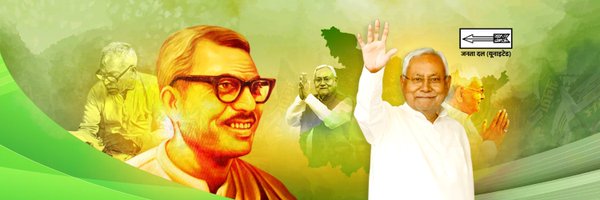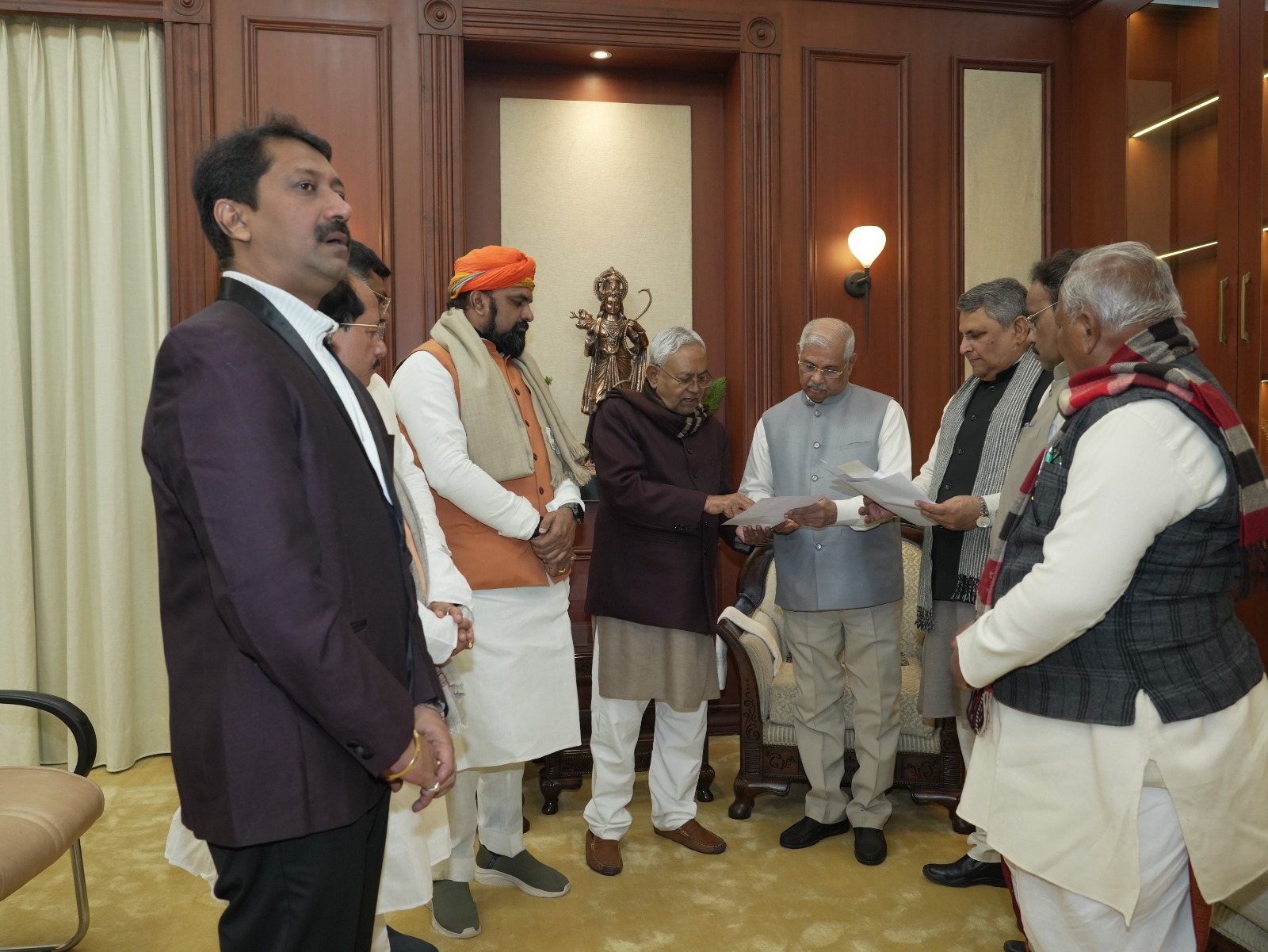
Photos of late Karpoori Thakur along with Nitish Kumar on the Janata Dal (United) banner on its official X handle.
Counterpoint: The Karpoori impact on Bihar’s changed political landscape
Can we call it the Karpoori Thakur impact on Bihar’s changed political landscape? Unquestionably, if there is any one person responsible for this sudden turnaround of things in the state, then he is no other than two-time chief minister, late Karpoori Thakur!
Nitish Kumar today resigned as Bihar Chief Minister and his party, broke his alliance with Lalu Yadav’s Rashtriya Janata Dal (RJD), and met Governor Rajendra Vishwanath Arlekar along with other leaders of his party, the Janata Dal (United) as well as the Bharatiya Janata Party (BJP), and Hindustani Awam Morcha (HAM), and an independent MLA to stake claim to form the government.

Thus the Janata Dal (United) is now back with the Bharatiya Janata Party-led National Democratic Alliance ahead of the impending general elections. The total number of seats in the Bihar Legislative Assembly is 243 and 122 are required to get the majority. Nitish’s JD(U) has 45 seats and is now supported by the BJP’s 78 MLAs, HAM’s 4 and 1 independent to sit comfortably with 128 MLAs in the Bihar House. The RJD remains the single largest party in the state Assembly with 79 legislators, while the Congress has 19 and the Left has 16.
Nitish is set to continue as the Chief Minister and is expected to guide the BJP-led NDA to victory in Bihar, which, with 40 parliamentary constituencies, is so important for Prime Minister Narendra Modi in his bid to regain his position after the general election. Credit to Modi that he pulled yet the rabbit out of the bag, and by naming Karpoori for the Bharat Ratna, he pulled the rug out of Nitish’s carefully cultivated Extremely Backward Caste (EBC) constituency.
In Bihar’s caste-ridden politics, whether the immediate provocation to Nitish to dump his alliance with Lalu Yadav was the Centre’s decision to confer the nation’s highest award, the Bharat Ratna, on socialist late Karpoori Thakur, an icon of the backwards in Bihar, could be debated but cannot be negated. It is indeed astonishing that 36 years after his death, Karpoori still wields such influence on the political and social landscape of Bihar!
Also read:
- Bharat Ratna to Karpoori Thakur: Storm in a teacup?
- 36 years after his death, Karpoori Thakur gets Bharat Ratna
Just a few days back, on January 24, 2024, Karpoori’s birth centenary was celebrated. It is imperative to recall his persona in this context.
Karpoori Thakur yearned to empower the voiceless class of people languishing at the bottom of the social pyramid, incessantly crying for the policymakers’ attention, which was simply non-existent, and seldom forthcoming.
Late Dr Jagannath Mishra, the former chief minister of Bihar, in a conversation with this columnist, had once categorically vouched for the immaculate character of Karpoori Thakur. It so happened that Karpoori Thakur was in need of rupees thirty thousand for some social work. The amount of money was not coming his way, yet he would not accept help from anyone, including his friends in politics. Late Lalit Narayan Mishra, the then Union minister of Commerce and Trade, somehow came to have the whiff of the whole matter. He instantly invited Karpoori Thakur for lunch at his residence. Lalit Narayan Mishra knew that Karpoori, despite his pressing need, would not accept any help from him. Thus he kept the amount of rupees thirty thousand inside his tiffin box. Despite being an opponent, Lalit Narayan Mishra deeply respected Karpoori Thakur for his impeccable character which earned the Socialist leader wide respect from one and all.
Significantly, during his tenure as the education minister of Bihar, Karpoori’s pioneering decision to remove English from the school syllabus proved to be the biggest respite for the students from rural hinterland for whom English was a phobia, negotiating with which purportedly appeared as some form of impossible task for them. Worse still, the monster of English, invariably contributed towards the failing of students from impoverished backgrounds in villages, resulting in wide frustration among the vast section of people who felt that education was the prerogative of only the elite class of people, with an anglicised family template. Unequivocally then, the abolition of English from the school syllabus by Karpoori Thakur, soon after his elevation as the Education Minister of Bihar, proved to be a blessing in disguise for the vast section of people from the rural background. However, the deterioration of the standard of English language in Bihar adversely impacted the students of the state in landing jobs outside the state. Regrettably, the students of Bihar, on account of the complete elimination of the English language, strategically suffered to compete with the students of other states. Yet Karpoori, despite contributing to strangling the education system of Bihar, had a subtle underlying message to convey: India should not fall back upon the colonial legacy to re-discover its indigenous glory.
Moreover, Karpoori Thakur, in myriad ways, was the harbinger of a new dawn; a panacea for the hitherto prevalent hierarchical social mindset which had the underpinnings in feting and coveting those from higher caste to adorn the highest political position of the state.
Thus the elevation of Karpoori Thakur as a chief minister of the state, from the barber community, heralded the dawn of a new political system which promoted meritocracy, thereby, posing a daunting challenge to the hitherto upper caste domination in politics. From December 1970 to June 1971, and later from June 1977 to April 1979, Karpoori Thakur adorned the position of the chief minister of the state twice, apart from being the second deputy chief minister of the state. It was a tribute to his robust resolve to revolutionise society towards socialistic values. Significantly, his elevation was a celebration of the spirit of egalitarianism which sought to revolutionise the social mindset: even a barber could rise to the position of the chief minister, dawning a new social renaissance in the state riven by castes, where the birth, rather than merit, was considered to be the hallmark for one’s success. Of course, there were repercussions among the forwards in the state and a derogatory slogan too got into circulation during that period: “Karpoori kar poora, chhod gaddhi, dhar ustara (Karpoori complete your job, quit the seat of power and hold the razor)”.
Unequivocally then, Karpoori Thakur broke the caste jinx; his rise symbolised, in myriad ways, the dawning of democracy at the grassroots level; the stereotypical mindset which sought to solidify the complete domination of higher caste in politics, purportedly pulverised at the elevation of someone from the barber community to preside over the destiny of Bihar. He had to quit his Chief Ministership due to the revolt within his government following his decision to implement the recommendations of the Mungeri Lal Commission report on reservations for Backward Castes in government jobs.
In other words, Karpoori Thakur’s meteoric rise, much before the advent of the Mandal Commission Report, was the biggest social churning out to have happened in Bihar politics. This churning process is far from over though, as the latest political developments in the state prove.
*Author, Academician and Public Intellectual. Views expressed are personal.






